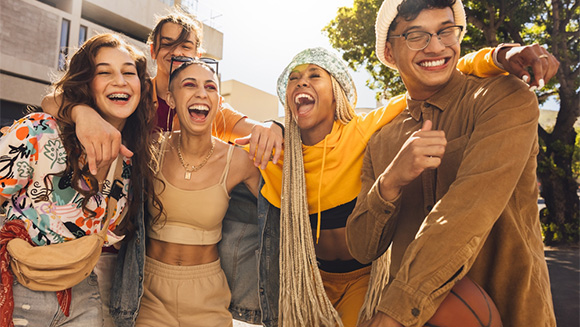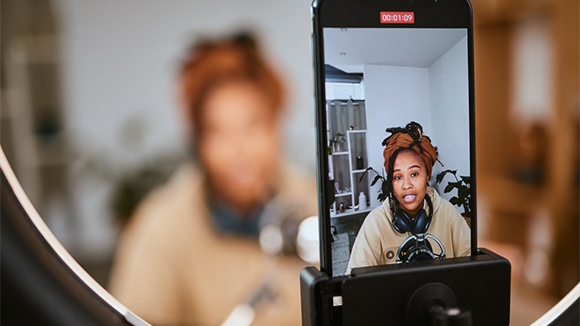As the first generation to be born to a truly digital world, Gen Z has lived their entire lives at not just the mercy, but the speed of the newest technology – which can make keeping track of current trends challenging. Let’s check out these seven quickly before they change again!

As a member of Gen Z, I can honestly say that this generation is hard to keep up with. We cycle through trends hourly, consume and promote what we love, and are just as vocal about the things we dislike—just check our social media. I mean the Z stands for Zoomer, so I suppose we are living up to our name.
It can be hard to know exactly what we’re doing, which is why I have compiled a list of the top seven trends to look out for among Gen Z in 2023, and I suggest you read it fast before we cycle to the next seven!

1. Short-Form Content
According to an article by Oliver Wyman Forum, 55% of Gen-Z prefer videos that are less than 60 seconds long and this past summer, Gen Z attendees at VidCon noted that short-form content on platforms like TikTok, YouTube Shorts, and Instagram reels mimic the act of channel surfing. With a generation that was raised in the digital age, this comes as no surprise—we’ve become an instant gratification generation, and as a result, our attention span has decreased greatly. We want what we consume to be clear, concise, and preferably something we can digest and understand quickly by scanning our eyes over it only once.
See how short this section was? :)
As platforms have started to take note of this trend by making video durations shorter, brands and content creators have followed suit and have pivoted to making shorter videos across all platforms. Tiktok, for example, has incorporated a playback speed setting that allows users to watch videos at 2x speed or allows the creators themselves to speed up their voices, which makes someone scrolling past stay on the video longer and garners a wider audience in the long run.

2. Mental Health Awareness
Gen Z has been extremely vocal about their mental health struggles, and in 2019, a survey done by the American Psychological Association reported that Gen Z is 27% more likely to report their mental health as fair or poor. Social media has been utilized by Gen Z to make the conversations around mental health less scary. Mental illness has been destigmatized by individuals talking openly and honestly about their struggles and connecting with others who are dealing with the same or similar things, which creates a sense of community.
This has led to schools and workplaces taking mental health more seriously, adapting their spaces to accommodate the needs of their students, and approaching these issues with the empathy and care they deserve.
Explore Mental Health Services @ Coastline
3. Visually Inclined
Gen Z values visual storytelling—again, the digital age generation—and their daily use of visually centered social media like Instagram and TikTok is evidence of that.
Photo dumps, which are just multiple photos posted at once, have become popular amongst this generation across all platforms, with some users even decorating their photos to create a scrapbook-like effect, and infographics, which are graphic visuals comprised of images, pie charts, and other data visuals, have also become popular on Instagram as they are specifically made to be eye-catching, short, and concise summaries of information about important issues. In certain situations, their usefulness has been rightfully questioned, but when information on something is needed, they are constantly shared on Instagram stories, so I suppose they are working to some effect.
Similarly, podcasts, though they’re considered long-form content, are still a staple for Gen Z, and podcasters have recently been taking a visual approach. Edison Research’s Gen-Z 2023 Podcast Listener Report states that 71% of Gen Z consume podcasts with video, and 49% say they can observe tone and context better through facial and gestures when watching visually.
Many popular podcasts have taken to filming their segments in addition to recording the audio, and posting the videos on YouTube, as well as posting short attention-grabbing clips across their social media platforms which aids in discoverability and is more appealing to Gen Z listeners.

4. Personalization
From their education to their for-you pages on TikTok, Gen Z thrives off personalized content. Salithru.com reports that 84% of Gen Z say that their favorite brand treats them like an individual. They are more inclined to consume something if they feel it is catered to them specifically, and not just any customer, which is why personalized content is beginning to become a staple within brands and companies.
Higher education is taking the personalized content route by customizing and tailoring courses and lessons to fit the unique needs of each student, which will increase student engagement and retention. In the same vein, Spotify is extremely popular because it analyzes listener data to create customized playlists tailored to users’ tastes. Overall, Gen Z wants to feel like they’re being heard, be able to see themselves in what they’re consuming, and know that it’s going to serve them in the long run.

5. User-Generated Content and Relatability
User-generated content and relatability go hand and hand with personalized content. According to Wallaroomedia’s insights, 60% of TikTok users are a part of Gen Z, and with the rise of influencers in this generation, more and more brands and companies are reaching out to them as opposed to celebrities, because the Gen Z audience can relate and see themselves in who they’re being influenced by.
This is because influencers start off and are typically regular everyday people—Gen Z’s peers—who just started posting content and gained a following from it. If they see an influencer that they like using a product, for example, a face wash, and they speak highly of it, they’ll want to use it too because they like this person and see them as relatable.
However, this is tricky to navigate because once they feel that they can’t relate to them anymore, they fall out of interest, and once they reach a certain level of fame, they start to question whether what they’re promoting is authentic or just for monetary purposes.

6. Diversity and Inclusion
Pew Research Center’s data states that Gen Z is more racially and ethnically diverse than any previous generation before them, and it’s imperative for them that this is reflected and valued in whatever space they enter—it’s what makes them who they are. They want to feel that they have the freedom to exist exactly as they are, without having to adapt in spaces that don’t value or celebrate their differences, and they can spot when people, brands, and companies are being performative in their allyship and activism.
Gen Z has spearheaded diversity and inclusion in their generation and others by amplifying the voices of marginalized communities on social media and demanding that their workplaces, schools, companies, and brands with large platforms speak up and do the same because they can’t do it alone. YPulse ranked Savage x Fenty, Rihanna’s brand, number 1 on their list of Gen Z’s most inclusive brands, because they show various models of different body types, have an expansive range of sizes, and focus on self-empowerment and love.
Explore Diversity and Inclusion @ Coastline
7. Prioritizing Work-Life Balance
The workaholic trope is entertaining to watch in romcoms, but in real life, it’s draining, and undesirable to Zoomers, and they’re making it known. A survey done by the Wall Street Journal found that 49% of Gen Z saw work as the second most important thing to their identity, and 26% stated that their peers’ work-life balance impressed them the most.
The want for work-life balance has caused older generations to brand Gen Z-ers with the label of lazy and soft, but I personally think it comes down to not wanting to experience burnout, which FutureForum reports has been at an all-time high since May 2021.
In WSJ's survey, Gen Z’s ways of combating an unbalanced work life were not answering emails past a certain time, and muting work notifications once they’re off the clock. They don’t want their job to consume their life, and the flexibility of a balanced work-life is what they are striving for, especially if they are being overworked, undervalued, and facing uncertainty about the status of their jobs as worldwide layoffs permeate the news.

Conclusion
As I’m sure you can tell, social media is a common thread throughout all these trends, and what has amplified them greatly. It’s how we find our entertainment, connect with others, help each other and ourselves, and find ways to make the world a better place. As social media and technology continue to grow and expand, Gen-Z will continue to be a generation to watch.